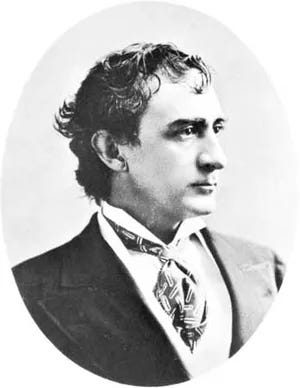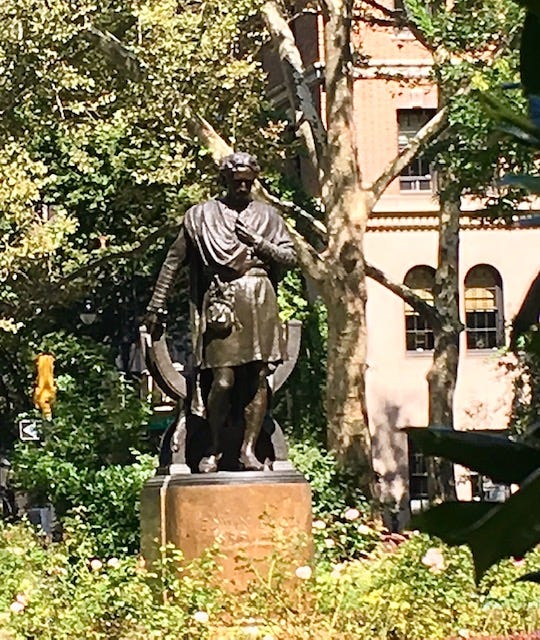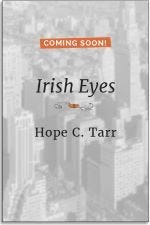On Friday, April 14, 1865, President Abraham Lincoln attended a play at Ford’s Theater in Washington, DC. America’s bloody four-year Civil War (April 12, 1861 - April 9, 1865) had ended just five days earlier with Confederate general Robert E. Lee’s surrender at Appomattox Court House. The Union was preserved; slavery abolished. While there was much to be done to restore a badly divided nation, an evening’s outing must have seemed entirely warranted, a theatrical comedy — “Our American Cousin “ — the perfect antidote to the prior four wearying years.
By now, most are familiar with the barebones details of the tragedy. At 10:15 pm, twenty-six-year-old John Wilkes Booth slipped into the President’s private box and fired his pistol into the back of Lincoln’s head. The deed done, Booth leapt onto the stage and with theatrical flourish shouted, “Sic semper tyrannis!” —“Thus ever to tyrants!”— the Virginia state motto then as today.1
Such theatrics came naturally to Booth. The native Marylander, Confederate sympathizer, and now presidential assassin hailed from a family of famous thespians and was himself a known actor. Just five months earlier, on November 25, 1864, he had appeared on Broadway alongside two of his brothers, Junius Brutus Jr. (born 1821) and Edwin (born 1833) in a benefit performance of Julius Caesar to raise money for a statue of William Shakespeare in New York’s Central Park.2 (The statue still stands). Promotional handbills enticed theatergoers to see “THE THREE SONS OF THE GREAT BOOTH”; the single night production was a sell-out.3

While Junius was named for their famous father, a legendary albeit troubled Shakespearean tragedian, it was Edwin who inherited the lion’s share of his sire’s acting chops. Unlike his brothers, he also had the business savvy to cash in on his considerable talents. Edwin owned the Winter Garden, the Broadway theater that hosted the benefit, whereas John Wilkes was plagued by bad business deals.4
Nor did Edwin share his firebrand baby brother’s pro-South politics. During the benefit performance, a fire broke out in a nearby hotel, bringing the play to a short pause. The next day, newspapers reported that the fire was part of a Confederate plot to burn down New York City; fires had been set in 19 hotels, a theater, and P.T. Barnum’s museum. When John Wilkes expressed passionate support for the attacks, Edwin tossed him out of his apartment and declared he would never again be welcome.5
It would be the last time the two siblings saw one another.
When the twelve-day manhunt for John Wilkes ended with a Union soldier shooting him dead, Edwin took the news as “a blessed relief.” 6
After the assassination, Edwin stepped away from the stage for nearly a year. Fortunately, theatrical audiences were forgiving. To restore his family’s name, and his personal reputation, he built the Booth Theatre in New York, opened in 1869, and founded The Players at 16 Gramercy Park. A private social club devoted to the arts, The Players remains one of New York’s most vibrant and exclusive venues.7
Across from the club, a statue of Edwin Booth garbed as Hamlet, one of his signature roles, stands watch from within Gramercy Park, Manhattan’s only existing private park. A key to the gated park is a coveted privilege of residency in one of the square’s park-facing townhouses and apartments. (In Irish Eyes, coming Dec. 2023, Rose knows she’s “made it” when she can afford to move her family from the Lower East Side to a townhouse in tony Gramercy Park).
Edwin Booth died June 7, 1893, in his apartment in The Players clubhouse. By then, he was revered as America’s leading tragic actor, as extolled in this September 1893 issue of The Atlantic.
THE keen sense of loss which has come to the American people because of the death of Edwin Booth may well be shared by all the English-speaking communities of the world… for many years Mr. Booth has had no rival as a tragedian among those actors who use our language; and it is equally plain that there is to-day not even a candidate for his vacant place.8
Every year, on November 13th, Edwin Booth’s birthday, members of the Players place a wreath on his statue.9
Share this free public post with other history lovers!
Not yet subscribed to History With Hope? You can fix that here.
IRISH EYES (coming December 2023), Book 1 of my American Songbook series, spans twenty-five years of Gilded Age through the Jazz Age Manhattan, as seen through the eyes of spirited Irish-born Rose O’Neill. Read more here.
Curiously, after the murder, the motto was never retired. Oklahoma City bomber, Timothy McVeigh wore a tee-shirt with the phrase and a picture of Lincoln when he was arrested on April 19, 1995.
https://www.history.com/news/john-wilkes-booth-family.
Ibid.
https://lithub.com/on-that-time-john-wilkes-booth-and-his-brothers-starred-in-julius-caesar/
https://www.bostonglobe.com/ideas/2015/04/11/how-boston-embraced-john-wilkes-booth-brothers/ncAHdTNC7BCHlJXMKvHGnJ/story.html
https://www.news.com.au/lifestyle/food/restaurants-bars/inside-the-players-club-nycs-most-historic-lounge/news-story/be8b3dcca01ae4ac268227c57b6f1be6
https://www.theatlantic.com/magazine/archive/1893/09/edwin-booth/633493/
https://www.news.com.au/lifestyle/food/restaurants-bars/inside-the-players-club-nycs-most-historic-lounge/news-story/be8b3dcca01ae4ac268227c57b6f1be6






There was a huge mural in our main post office of Edwin Booth acting. I can't remember if it's still there--I often go to one of the smaller post offices.
The Booth family home, Tudor Hall, is in my county. It used to be privately owned--I went to a Christmas open house when it was (in the mid-90s)--but now it's owned by the county. https://www.visitharford.com/listing/tudor-hall/291/
http://spiritsoftudorhall.blogspot.com/
https://en.wikipedia.org/wiki/Tudor_Hall_(Bel_Air,_Maryland)
Interesting fact, several well-known actors were part of a preservation society which tried to buy it to protect it. Hal Holbrook, Dixie Carter, Stacy Keach, and more:
https://www.baltimoresun.com/news/bs-xpm-1999-10-17-9910170052-story.html I apologize if there's a paywall.
If memory serves me right, you're from the Baltimore area originally and may have know about the Booth history here.